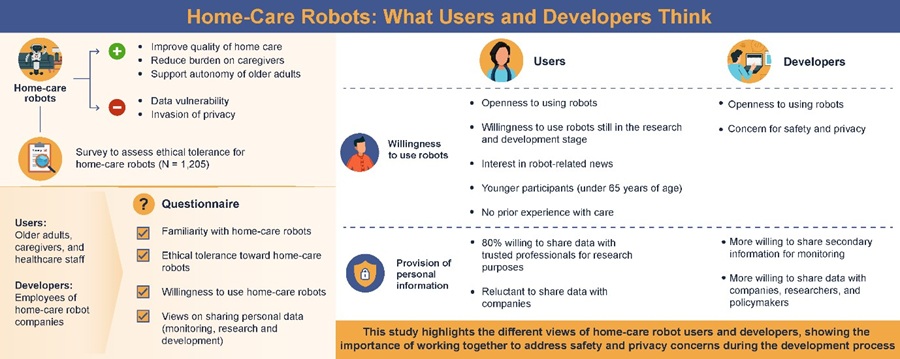Survey shows broad openness among users when privacy, safety, and trust are ensured
Are we ready to live with caregiving robots? With Japan facing a projected shortage of 570,000 care workers by 2040, researchers at Chiba University surveyed older adults, families, caregivers, and developers about their acceptance of home-care robots. They found that openness to using robots influenced willingness among both users and developers, while other factors differed between the groups—revealing distinct perspectives and highlighting the need for collaboration and ethical awareness in developing home-care robots.

Image title: Surveying attitudes toward home-care robots in Japan
Image caption: Researchers at Chiba University conducted a large-scale survey among older adults, families, caregivers, and developers to understand the acceptance of home-care robots, highlighting how privacy, safety, and trust influence willingness to use these technologies.
Image credit: Prof. Sayuri Suwa from Chiba University, Japan
Source link: https://www.sciencedirect.com/science/article/pii/S074756322500264X?via%3Dihub
Image license: CC BY 4.0
Usage Restrictions: Credit must be given to the creator.
Robots have never felt as close to becoming a part of everyday life as they do today. Their widespread use now seems likely in the near future. But as technology advances, important social questions remain. Are we ready to live and work alongside robots? Many people worry about safety, the loss of human contact, high costs, and the potential for robots to take over human jobs. These concerns are especially important when it comes to caregiving robots that assist older adults.
A new study by researchers at Chiba University in Japan reveals a general openness to using home-care robots, as long as people view them as beneficial to society. The findings highlight the delicate balance developers must strike between innovation and maintaining users’ trust.
The study, made available online on September 27, 2025, and published in Volume 174 of the journal Computers in Human Behavior on January 01, 2026, was led by Professor Sayuri Suwa from the Graduate School of Nursing at Chiba University, Japan. The research team also included Dr. Yumi Akuta from Tokyo Healthcare University, Japan; Dr. Naonori Kodate from University College Dublin, Ireland; Dr. Wenwei Yu from Chiba University; and Dr. Mayuko Tsujimura from Shiga University of Medical Science, Japan.
“Crucially, the results indicate that greater collaboration between users and developers, together with careful attention to ethical considerations, is essential for accelerating the adoption and societal implementation of home-care robots,” says Prof. Suwa.
Caregiving robots are expected to play an important role in Japan, which has the world’s fastest-aging population and a shortage of care workers. By 2040, the country may lack around 570,000 care workers. To understand how people feel about home-care robots, the researchers conducted a large survey with 4,890 participants, including older adults, their families, caregiving staff, and robot developers.
Participants were asked about their willingness to use home-care robots and whether they would share personal data with them. Questions included, ‘Would you like to use a home-care robot when receiving care yourself?’ and ‘Would you like to use one when caring for a family member?’ They were also asked what types of personal information, such as vital signs, voice recordings, and location data, they would be comfortable sharing with robots.
Out of the responses from 1,122 potential users and 83 developers, the results showed that willingness to use home-care robots varied by age and familiarity. People under 65 years of age were the most open to using robots, both for themselves and their families. Women were slightly more positive than men. Participants who followed robot-related news or were interested in testing new robots were also more willing to use them.
Developers, on the other hand, were mainly concerned about safety and privacy. Both users and developers who supported robot use said that protecting privacy was important. They also expressed a desire to participate in developing and improving home-care robots.
When it came to sharing personal data, about 80% of users said they were willing to share information such as vital signs and voice data with healthcare professionals for research. But only 40–50% were comfortable sharing that data with robotics companies. This shows that trust and transparency are key factors in how people view robots.
“Our results conclude that a collaborative ecosystem involving all stakeholders, aligned with ethical principles and shared interests, is essential for the successful development and implementation of home-care robots. Through such collaboration, these robots can support older adults in living independently within their homes and communities, while also easing the burden on family and professional caregivers,” emphasizes Prof. Suwa.
As Japan’s aging population continues to grow, using robots and other innovative technologies in home care will become an important part of addressing social and healthcare challenges. With careful planning and attention to ethics, home-care robots could help create a society where people and technology work together to support well-being, independence, and dignity in old age.
To see more news from Chiba University, click here.
About Professor Sayuri Suwa from Chiba University, Japan
Dr. Sayuri Suwa is a Professor in the Department of Innovative Nursing for Life Course and Division of Community Health Nursing, Graduate School of Nursing, Chiba University. She also serves as the Director of the Interprofessional Education Research Center. Her work focuses on dementia care, community-based integrated care, and the ethical development and social implementation of home-care technologies. Her research examines how innovative technologies, such as caregiving robots, can support older adults and promote ethical, person-centered care. She has led several international comparative studies on the acceptance and ethical use of home-care robots in Japan, Ireland, and Finland.
Funding:
This work was supported by the Ministry of Education, Culture, Sports, Science and Technology (MEXT) Grant-in-Aid for Challenging Research (Pioneering), 21K18285, and the IAAR Next-Generation Research on Social Value Creation Research Support Program, Chiba University, Japan. The funding sources had no role in the design of the study; in the collection, analysis, or interpretation of data, in the writing of the manuscript, or in the decision to publish the results.
Reference:
Title of original paper: Willingness to use home-care robots and views regarding the provision of personal information in Japan: comparison between actual or potential users and robot developers
Authors: Yumi Akutaa, Sayuri Suwab, Tatsuhito Kamimotob, Hiroo Idec, d, Ayano Inuyamab, Naonori Kodatec, e, n, Atsuko Shimamuraf, Kieko Iidab, Akiyo Yumotog, Nana Kawakamih, Sachiho Jitsuisihii, Mayuko Tsujimuraj, Mina Ishimarub, Satoko Suzukik, Shunsuke Doil, Ayano Sakaib, Seiko Iwasem, and Wenwei Yun
Affiliations:
- Division of Nursing, Faculty of Healthcare, Tokyo Healthcare University
- Department of Community Health Nursing, Division of Innovative Nursing for Life Course, Graduate School of Nursing, Chiba University
- Institute for Future Initiatives, The University of Tokyo
- Faculty of Health Data Science, Juntendo University
- School of Social Policy, Social Work and Social Justice, University College Dublin
- Division of Community Health Nursing, Department of Nursing, Faculty of Health Science, Toho University
- Division of Community and Home Care Nursing, Faculty of Nursing, Kawasaki City College of Nursing
- Graduate School of Nursing, Chiba University
- Graduate School of Informatics, Chiba University
- Division of Visiting Nursing, School of Nursing, Shiga University of Medical Science
- Faculty of Medicine, Academic Assembly, University of Toyama
- Chiba University Hospital
- Faculty of Nursing Science, Uekusa Gakuen University
- Center for Frontier Medical Engineering, Chiba University
Journal: Computers in Human Behavior
DOI: 10.1016/j.chb.2025.108817
Contact: Sayuri Suwa
Graduate School of Nursing, Chiba University
Email: suwa-sayuri@faculty.chiba-u.jp
Academic Research & Innovation Management Organization (IMO), Chiba University
Address: 1-33 Yayoi, Inage, Chiba 263-8522 Japan
Email: cn-info@chiba-u.jp
Public Relations Section, General Affairs and Planning Division, Shiga University of Medical Science
Email: hqkouhou@belle.shiga-med.ac.jp
News Desk, University College Dublin
Email: newsdesk@ucd.ie
David Kearns, Media Officer, University College Dublin
Email: david.kearns@ucd.ie
Admission and Public Relations Office, Tokyo Healthcare University
Email: nyushi-koho@thcu.ac.jp
Recommend
-

Navigating Offshore Wind Power Expansion: Nurturing Ocean-based Wind Energy Management Experts through Industry-Academia Partnership
2023.09.28
-

‘Synergistic Campus Evolution with the Community’ Chiba University Design Research Institute (Part 2): Igniting ‘Cross-fertilization’ for a Revolutionary Vision
2023.12.25
-

What is “Digital Citizenship” Education that lives in a future society?
2023.03.10







